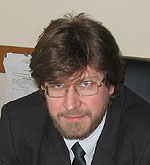© «Russia
in Global Affairs». №
1, January — March 2007
 Russia is
Russia is
entering a momentous election season. In December, Russian voters
will elect a new parliament, while in March 2008 they will vote for
a new president. Thus, the prospects for changes will be a
prominent subject in our journal throughout the year, especially
since the change of power in Russia traditionally has
an impact on all spheres of politics, including in the realm of
foreign policy. Experts differ in their forecasts about the future,
yet they agree that the next presidential term will be particularly
important. Russia’s transitional
period is coming to an end, and the country will have to choose a
long-term strategy for its development.
What will
the global conditions be like during the next decade for
Russia’s development? One group of experts, who participated
in a study entitled, The World Around Russia: 2017, presented a
comprehensive picture of the shape of the future. The study marked
15 years since the establishment of the Council on Foreign and
Defense Policy, the most representative and influential
non-governmental organization in Russia in this sphere.
The study will be presented in full at the Council’s anniversary
assembly in March and will later be published on our journal’s web
site.
This issue
carries two sections from this study that are devoted to subjects
of particular importance to Russia: the prospects of East Asia, a
neighboring region that plays an increasing role in Russia’s policy
and economy, as well as a forecast on global energy development and
Russia’s role in it.
Energy
problems are also the focus of two more articles in this issue.
Vladimir Feygin comments on Gazprom’s decision not to set up an
international consortium for developing the rich Shtokman gas
field. He views this decision as a manifestation of a new global
tendency. Tatyana Romanova analyzes why Russia and the
European Union
fail to achieve mutual understanding
in the energy sphere.
Vladislav
Inozemtsev offers an unorthodox view on relations with
Europe: he argues that Russia and the
United States are very much alike, as both are nothing more
than the “outskirts” of the European “center.”
Ivan
Safranchuk makes an attempt to determine the real priorities
of Russia’s foreign policy by analyzing the budget
allocations to this governmental sector. Some of his conclusions
are rather unexpected. For example, Moscow’s policy
toward the Commonwealth of Independent States is not an
overwhelming priority, he argues, as it is officially stated.
Several other articles focus on Russia’s relations with
its neighbors. Russian veteran diplomat Yuri Dubinin offers his
reminiscences about the difficult negotiations with
Ukraine over the status of the Black Sea Fleet. Zurab Todua
weighs Russia’s chances of
restoring normal relations with Moldova. Alexander
Aksenyonok discusses a hot topic: Will the future status of Kosovo
become a precedent for solving the problem of breakaway territories
in Georgia? Vladimir Ovchinsky writes about the activities
of the “Chinese mafia” in Russia.
Russia’s ongoing economic
development is a perennial topic for our contributors. Vladimir Mau
analyzes various modernization experiences across the world and
proposes models for Russia’s economic
strategy. Valentin Kudrov argues that if Russia continues
with market reforms, it will have an opportunity to gain leading
global positions in the next few decades. Olga Vendina discusses
various scenarios for the development of major Russian cities,
which are set to become epicenters of economic growth.
Finally,
the Chairman of Russia’s Constitutional Court,
Valery Zorkin, broaches a difficult international subject: how to
ensure the observance of human rights amidst the global
counterterrorism struggle and the broadened powers of the security
services?
In our next
issue, we will return to our primary topic: the role and place
of Russia in the system of influential international
institutions – the G8, the European Union, NATO, and the Shanghai
Cooperation Organization.










